AI personalization tools help businesses deliver tailored digital experiences by analyzing user behavior and preferences. These platforms are essential for improving engagement, driving conversions, and building customer loyalty. Here's a quick rundown of eight leading tools available in the US, highlighting their primary features:
- Adobe Target: Advanced A/B testing and audience segmentation, integrates well with Adobe Experience Cloud.
- Braze: Focuses on real-time personalization across email, SMS, and in-app messages, ideal for mobile-first businesses.
- Dynamic Yield: Offers user-friendly personalization and testing, with strong e-commerce integrations.
- CleverTap: Great for mobile app engagement with real-time contextual messaging and predictive analytics.
- Insider: Combines AI-powered personalization with cross-channel automation for mid-sized businesses.
- Monetate: Tailored for e-commerce, with strong segmentation and dynamic content delivery.
- Personyze: Flexible tool for small to medium businesses, offering real-time behavioral tracking and dynamic content.
- Webflow Optimize: A no-code solution for Webflow users, featuring AI-powered A/B testing and content personalization.
The Top AI Marketing Tools for 2024
Quick Comparison
| Tool | Best For | Key Features | Pricing Starting Point |
|---|---|---|---|
| Adobe Target | Large enterprises | A/B testing, segmentation | Custom pricing |
| Braze | Mobile-first | Real-time personalization | $1,000/month |
| Dynamic Yield | E-commerce | Smart recommendations, testing | $2,000/month |
| CleverTap | Mobile apps | Predictive analytics, triggers | Custom pricing |
| Insider | Mid-sized businesses | Cross-channel automation | Custom pricing |
| Monetate | E-commerce | Dynamic content, segmentation | Custom pricing |
| Personyze | Small businesses | Behavioral tracking, pop-ups | $300/month |
| Webflow Optimize | Webflow users | No-code personalization, testing | $299/month |
Each tool has strengths tailored to specific needs, from enterprise-level solutions to budget-friendly options for smaller businesses. Your choice will depend on your goals, budget, and technical resources.
1. Adobe Target
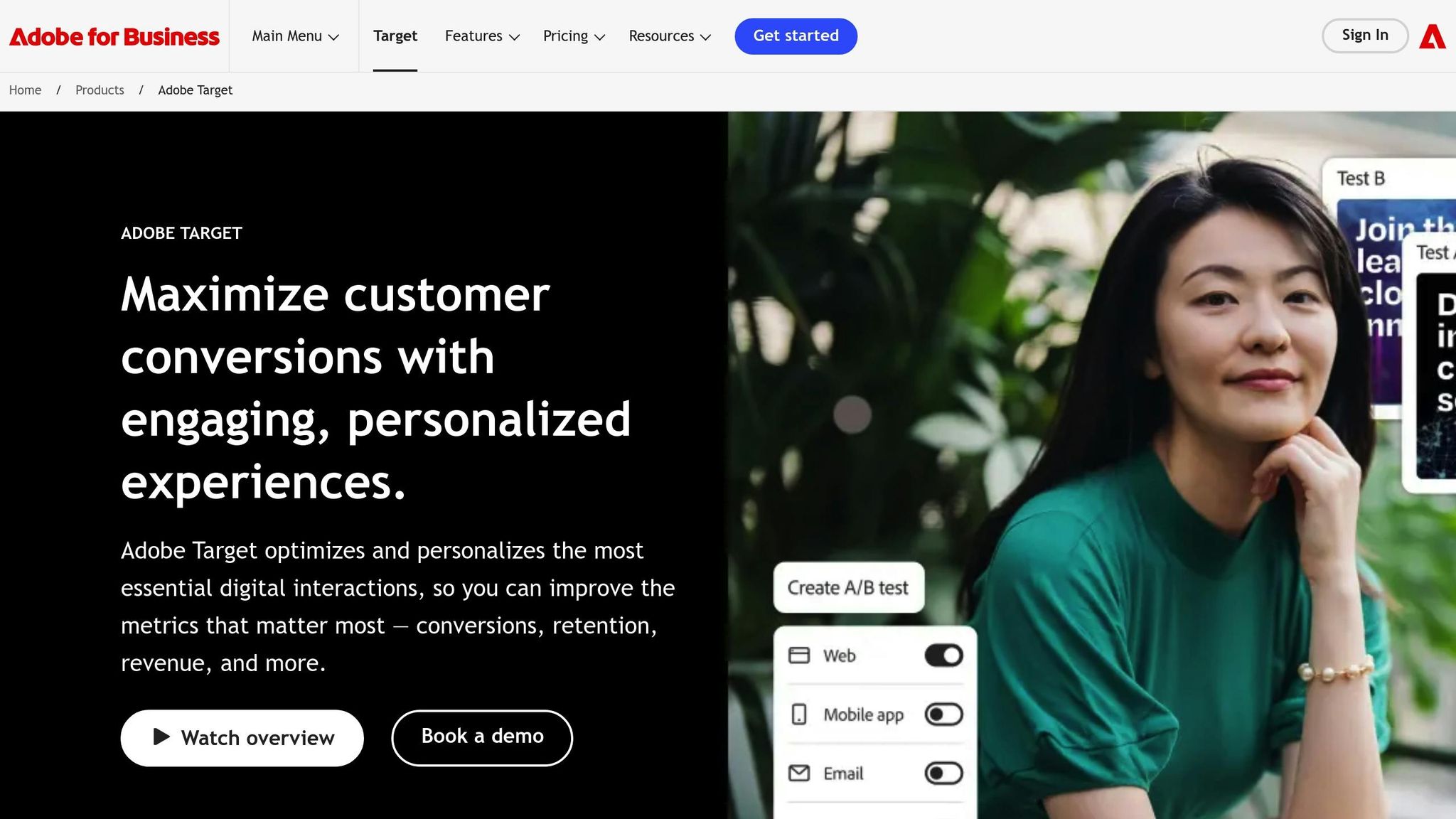
Adobe Target is a powerful tool designed to deliver tailored, data-driven experiences across various digital platforms. It focuses on precise testing and audience segmentation to refine personalization efforts.
Features
Adobe Target excels in A/B testing and optimization, leveraging advanced segmentation techniques. These include using demographic data, user behavior, and custom attributes to create highly targeted experiences.
Integrations
Adobe Target integrates seamlessly with other Adobe Experience Cloud applications, making it an essential part of a unified marketing strategy. Key integrations include:
- Adobe Analytics (via A4T): Enables detailed reporting and insights for content testing and personalization.
- Adobe Experience Manager: Facilitates content targeting and campaign management.
- Other Experience Cloud Apps: Works with tools like Adobe Campaign and Adobe Real-Time CDP to enhance personalization and reporting capabilities.
| Adobe Experience Cloud Integrations | Integration Method | Primary Use Cases |
|---|---|---|
| Analytics and Target | at.js library, appmeasurement.js library, Experience Cloud Core Services | Personalized content recommendations, A/B testing, sharing converter segments |
| Experience Manager and Target | Cloud configuration, Target Framework | Creating targeted content, managing campaigns, retrieving Adobe Target segments |
These integrations allow Adobe Target to seamlessly integrate into a broader marketing ecosystem, ensuring cohesive and effective personalization efforts across channels.
2. Braze
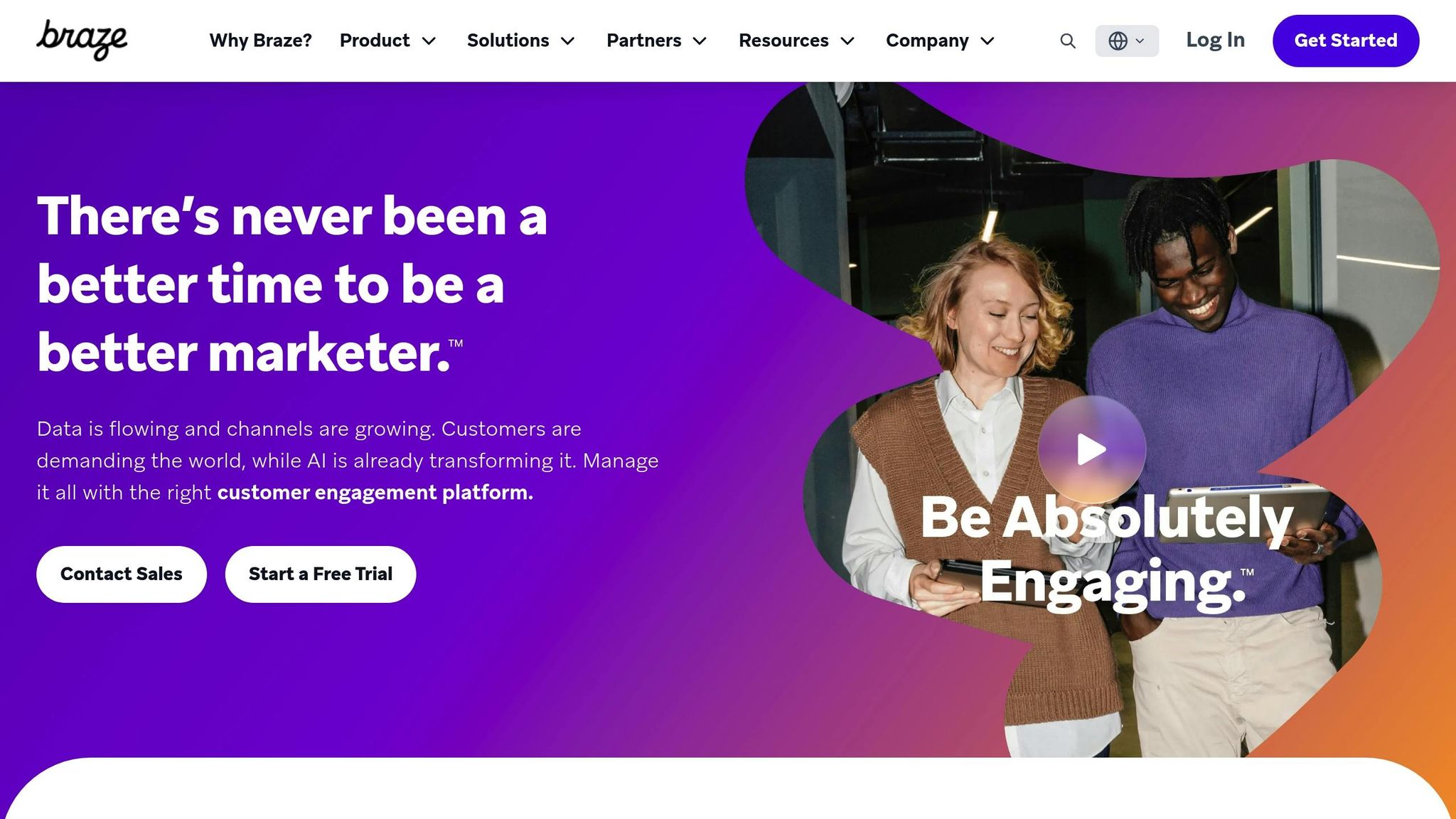
Braze is a customer engagement platform that uses AI to deliver personalized experiences across email, push notifications, in-app messages, and SMS. It’s designed to create tailored customer journeys across multiple channels. Let’s dive into the key features that make Braze stand out in real-time personalization.
Features
Braze’s real-time personalization is powered by analyzing customer behavior to predict the best timing and content for messages. Its Canvas feature allows marketers to design dynamic customer journeys that adapt based on user actions, creating a more responsive and engaging experience.
The platform ensures consistent messaging across all channels. With Canvas crafting the journey, Liquid enables detailed personalization within messages - like customizing subject lines or adding product recommendations based on individual user data.
Braze also uses predictive analytics to identify patterns like churn risks, purchase intentions, and content engagement levels. Plus, it integrates seamlessly with existing marketing tools, making personalization efforts smoother and more effective.
Integrations
Braze connects with over 150 technology partners, making it highly versatile. It integrates with major data platforms like Snowflake, Amazon Redshift, and Google BigQuery, ensuring smooth data synchronization.
E-commerce platforms like Shopify, Magento, and WooCommerce are also part of Braze’s ecosystem, enabling real-time catalog updates and triggering actions like abandoned cart recovery campaigns. Tools like mParticle and Segment enhance customer data connectivity, while Amplitude and Mixpanel provide advanced behavioral analytics.
Braze also connects with social media platforms like Facebook, Instagram, and TikTok, making it easy to run coordinated campaigns. For additional flexibility, webhook integrations allow connections with custom data sources and third-party apps.
Workflow Automation
Braze’s Canvas builder offers a drag-and-drop interface for creating customer journeys, handling exceptions like completed purchases or support requests with ease.
The platform includes Send Time Optimization, which determines the best times to deliver messages based on past user engagement. Frequency Capping prevents over-messaging by limiting how often users receive communications, reducing the risk of fatigue.
Action-based triggers respond instantly to user behaviors like app opens, website visits, or purchases, enabling immediate personalized interactions. Braze also supports holdout groups for A/B testing and campaign performance optimization, ensuring continuous improvement.
Pricing
Braze uses a pricing model based on monthly active users (MAUs), starting at $1,000 per month. Costs scale depending on the number of users and the features required.
For larger user bases or annual commitments, volume discounts are available. Enterprise clients can negotiate custom packages that may include services like dedicated customer success management, priority support, and enhanced security options.
Implementation and onboarding are priced separately, depending on the complexity of the project and the timeline needed.
3. Dynamic Yield
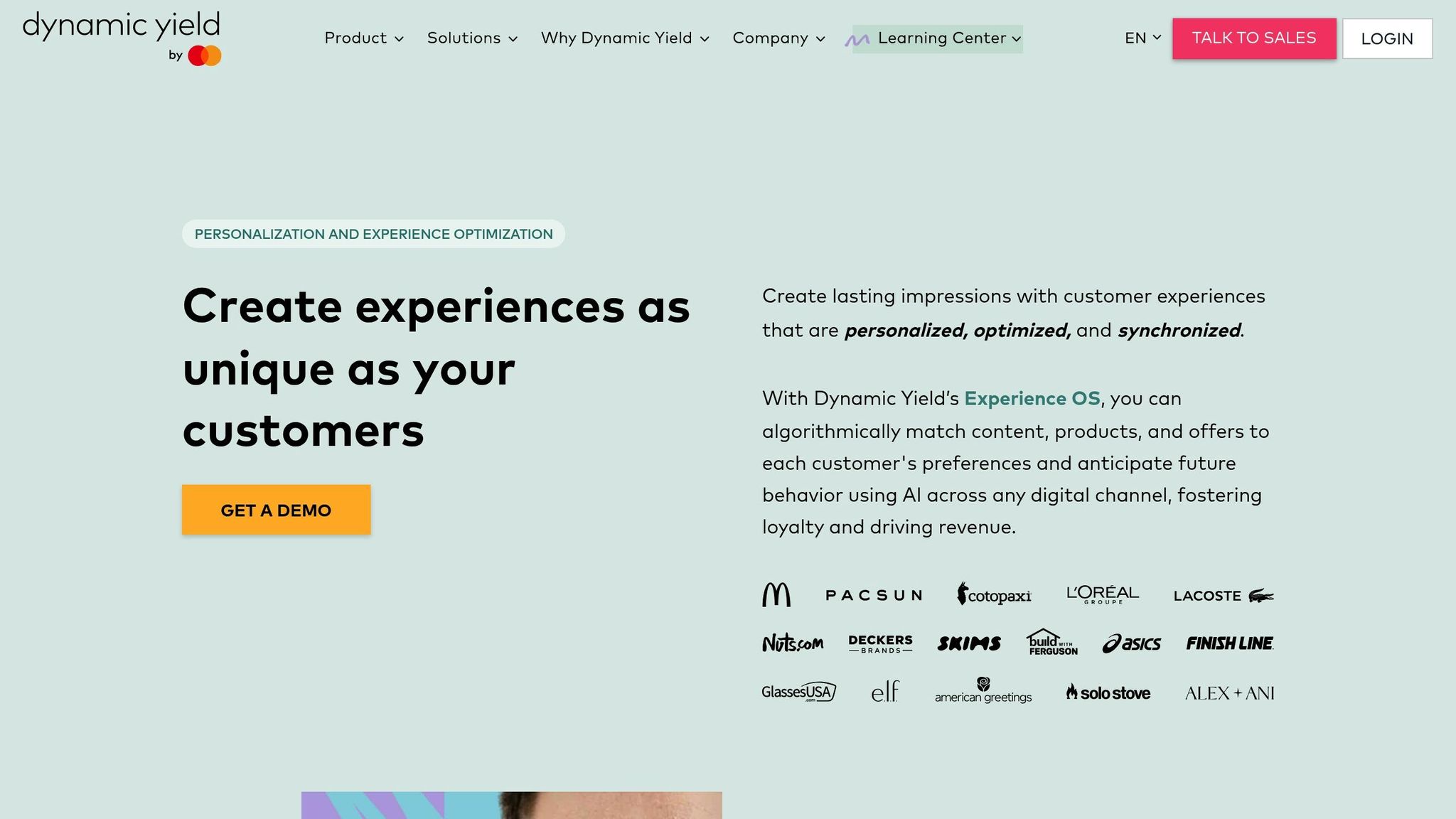
Dynamic Yield is an AI-driven platform designed to personalize user experiences across websites, mobile apps, and email. By analyzing real-time behavior, it delivers tailored interactions and can run multiple personalization campaigns simultaneously without overlap or conflicts.
Features
Dynamic Yield's Experience OS simplifies personalization by automatically segmenting users based on their behavior, demographics, and context. This eliminates the need for manual rules, making it easier to deliver relevant experiences.
The platform's Smart Recommendations engine employs deep learning and collaborative filtering to suggest products or content in real time. It adapts instantly to changes in user behavior, ensuring recommendations stay relevant.
For testing, Dynamic Yield supports both A/B and multivariate testing, automatically directing traffic to the best-performing variations while sidelining underperformers.
Another standout feature is behavioral messaging, which allows for dynamic pop-ups, banners, or overlays triggered by specific user actions - like exit intent, time spent on a page, or scrolling behavior. These messages can be personalized using product catalogs or user profile data.
All these features are complemented by an extensive range of third-party integrations, enhancing its functionality.
Integrations
Dynamic Yield seamlessly connects with over 200 third-party platforms, offering robust integration options. It works directly with major e-commerce platforms like Shopify Plus, Magento Commerce, and Salesforce Commerce Cloud, enabling real-time synchronization of product catalogs and inventory updates.
For analytics, the platform integrates with tools like Google Analytics 4, Adobe Analytics, and Mixpanel to share user data and track campaign performance. It also connects with customer data platforms such as Segment, Tealium, and mParticle to enrich user profiles with additional insights.
Email marketing platforms like Mailchimp, Klaviyo, and SendGrid integrate smoothly, enabling coordinated campaigns across channels. Dynamic Yield can trigger emails based on user activity on a website or vice versa, ensuring a unified customer journey.
Enterprise clients benefit from integrations with Salesforce CRM, HubSpot, and Microsoft Dynamics, which leverage customer relationship data to create more refined personalization strategies.
Workflow Automation
Dynamic Yield's Automation Studio simplifies the process of building workflows with a visual interface. Marketers can set automation triggers based on user behavior, time delays, or external conditions.
The platform's Smart Allocation feature optimizes traffic distribution by automatically directing more users to high-performing experiences. If a particular variation resonates strongly with a user segment, the system shifts traffic accordingly.
With Audience Discovery, machine learning identifies new user segments by analyzing behavior patterns. This feature highlights targeting opportunities that might otherwise go unnoticed, helping marketers refine their strategies.
Dynamic Yield’s API-first architecture enables developers to build custom workflows and integrate personalization features into existing systems. Triggers can be created using external data sources, providing flexibility for advanced automation needs.
Pricing
Dynamic Yield follows a pageview-based pricing structure, starting at approximately $2,000 per month for up to 500,000 pageviews. Mid-tier plans range between $5,000 and $15,000 per month, while enterprise-level packages begin at $25,000. Implementation costs can range from $10,000 to $50,000, depending on the complexity.
For businesses interested in exploring its capabilities, Dynamic Yield offers a 30-day free trial, allowing potential customers to test the platform before committing to a subscription.
4. CleverTap
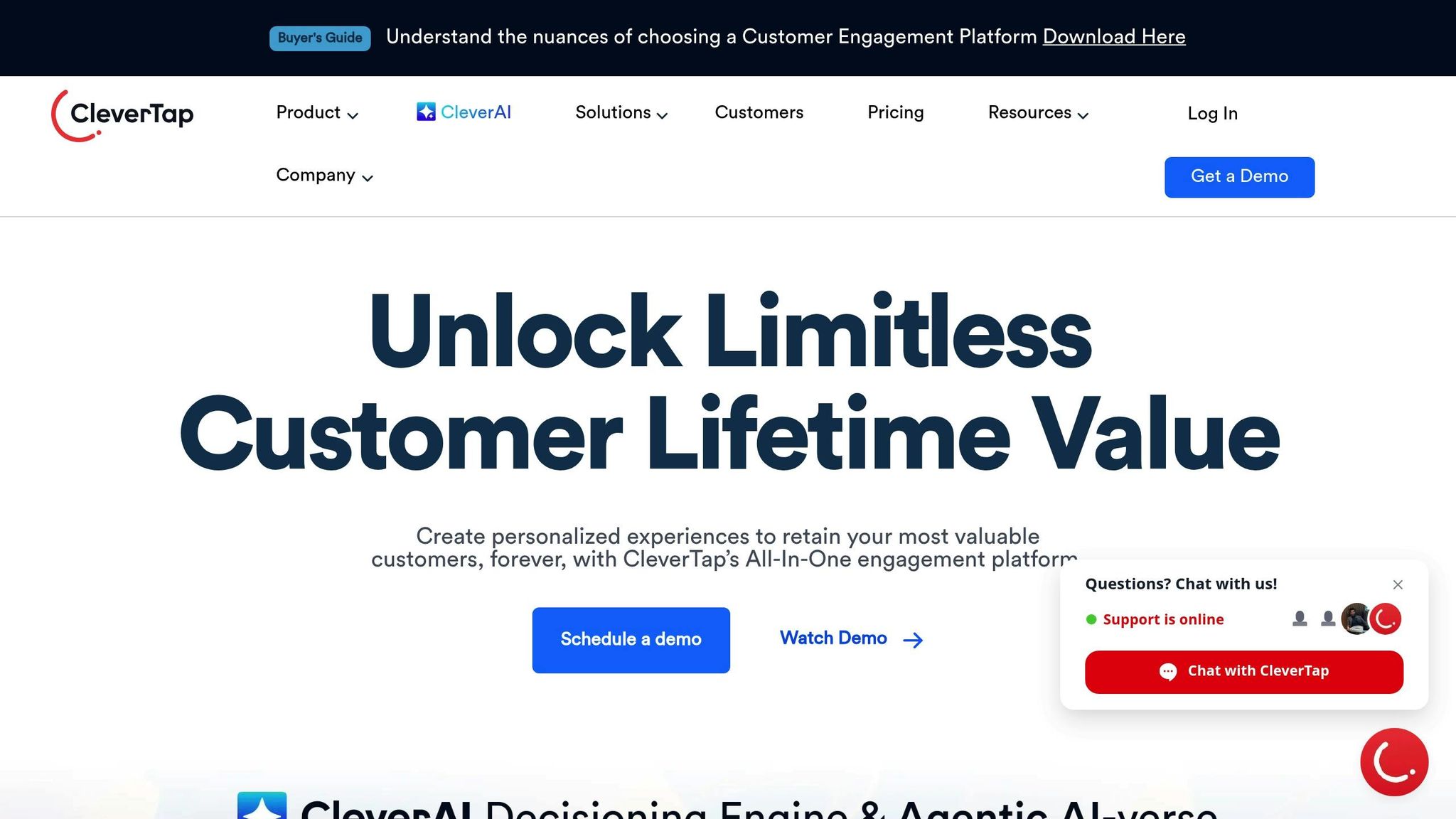
CleverTap is a customer engagement platform that uses AI to craft tailored experiences across various channels. Its main focus is on creating hyper-personalized interactions, making it a go-to choice for businesses aiming to deliver unique user experiences.
Features
CleverTap offers tools like the Visual Editor and Custom Templates to customize websites dynamically. With support for HTML, JSON, and liquid scripting, businesses can adjust content, product recommendations, and offers based on user attributes and behaviors.
The platform uses data such as demographics, loyalty status, language preferences, and past behaviors to refine personalization efforts. It also enables real-time contextualization, adjusting messages based on what users are doing at any given moment.
CleverTap Reminders help businesses send timely, personalized notifications across multiple channels, including push notifications, webhooks, WhatsApp, SMS, and email. Smart triggers and auto-cancellations ensure that messages are well-timed and don’t overwhelm users.
The Recommend Next Best Actions feature is another standout. It analyzes transaction patterns from similar users to suggest new product categories or personalized recommendations. This feature, powered by Clever.AI, provides actionable insights to help businesses make quicker, data-driven decisions.
Workflow Automation
CleverTap goes beyond personalization by automating campaign delivery, reducing the need for constant manual adjustments while keeping messages relevant.
Its Content Personalization add-on simplifies creating user-specific campaigns. Tools like Liquid Tags, Linked Content, and Bulletins allow businesses to personalize messages, while features like Catalog Send-Time Personalization, Constant Event Property Campaigns, and Geofencing trigger messages based on real-time user behavior and location.
The platform’s automation system uses its customer data and analytics to create dynamic segments that update in real time. This ensures users receive messages that align with their current engagement levels, keeping communication timely and relevant.
sbb-itb-5174ba0
5. Insider
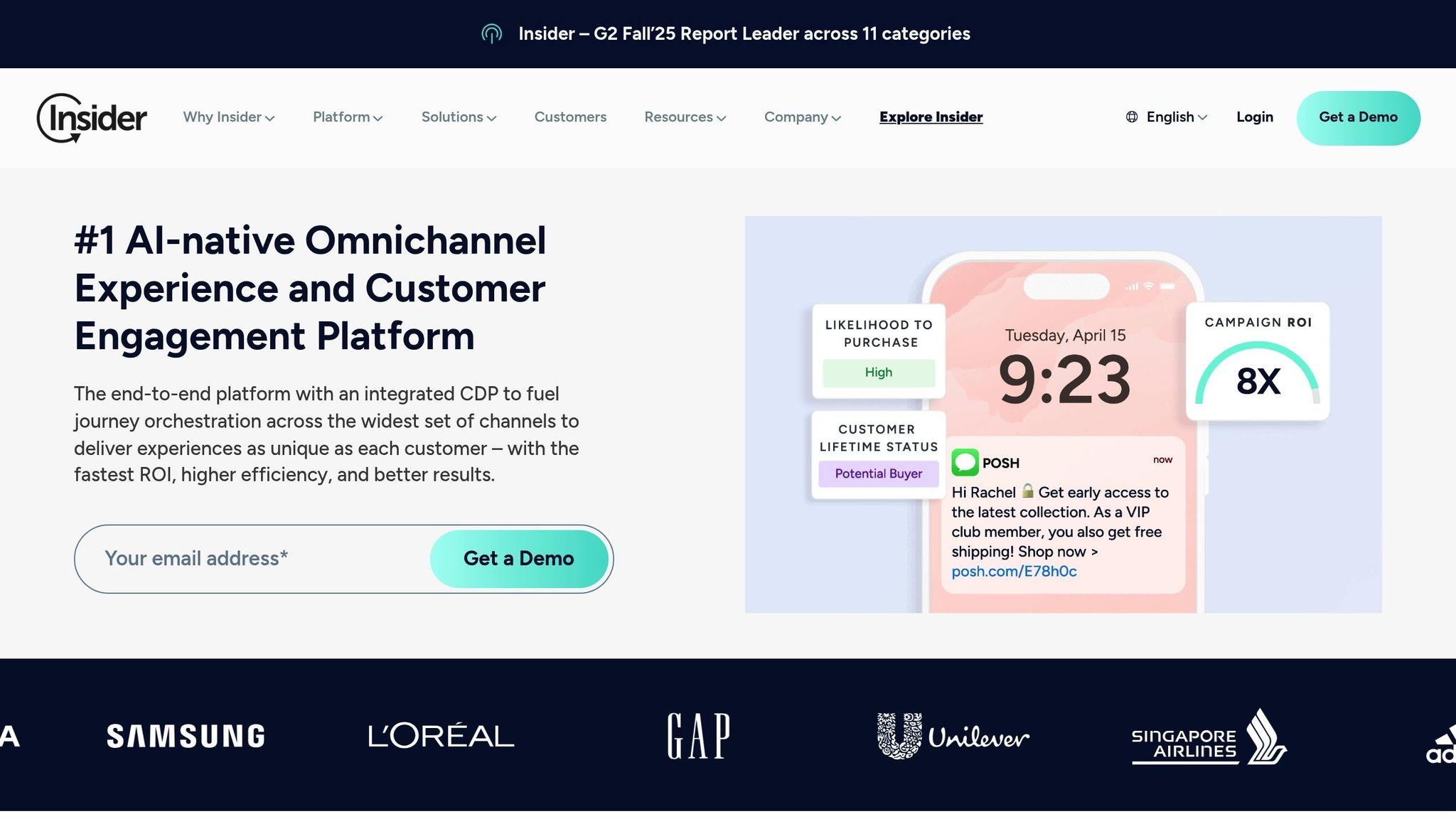
Insider combines AI-powered personalization with cross-channel automation to create seamless customer experiences across web, mobile, email, and even in-store interactions.
Features
Journey Builder uses user data - like browsing habits, purchase history, device type, and engagement patterns - to deliver dynamic, real-time personalized content.
With Web Personalization, businesses can enhance website experiences through dynamic content blocks, tailored product recommendations, and behavior-based pop-ups, all managed via an intuitive visual editor.
Predictive Segmentation taps into machine learning to identify high-value customers, predict churn risks, and estimate purchase likelihood. By creating audience segments based on behavioral insights, marketers can deliver messages that are both timely and relevant.
Cross-Channel Messaging ensures consistent personalization across multiple touchpoints, including email, SMS, push notifications, WhatsApp, and on-site interactions. For example, if a customer abandons their cart, the platform can automatically send an email featuring the products they viewed, along with customized discounts.
Integrations
Insider integrates seamlessly with a variety of marketing and analytics tools using native integrations and APIs. It supports popular platforms like Shopify, Magento, Salesforce, and HubSpot, as well as analytics and advertising tools such as Google Analytics and Facebook Ads Manager. Its Customer Data Platform (CDP) consolidates data from multiple sources into unified profiles, providing a centralized hub for personalization efforts.
The platform also works with major email service providers like Mailchimp, Klaviyo, and SendGrid. This allows businesses to continue using their existing email infrastructure while enhancing it with Insider's advanced personalization tools.
Workflow Automation
Insider takes automation to the next level by ensuring campaigns are delivered in real time to keep users engaged.
With Smart Triggers, the platform launches personalized campaigns based on user actions, like viewing a product page or adding items to a wishlist. A/B Testing Automation fine-tunes content and channel timing by directing traffic to the best-performing versions, while Lifecycle Campaign Automation adjusts messaging to guide customers from their first interaction through repeat purchases.
6. Monetate
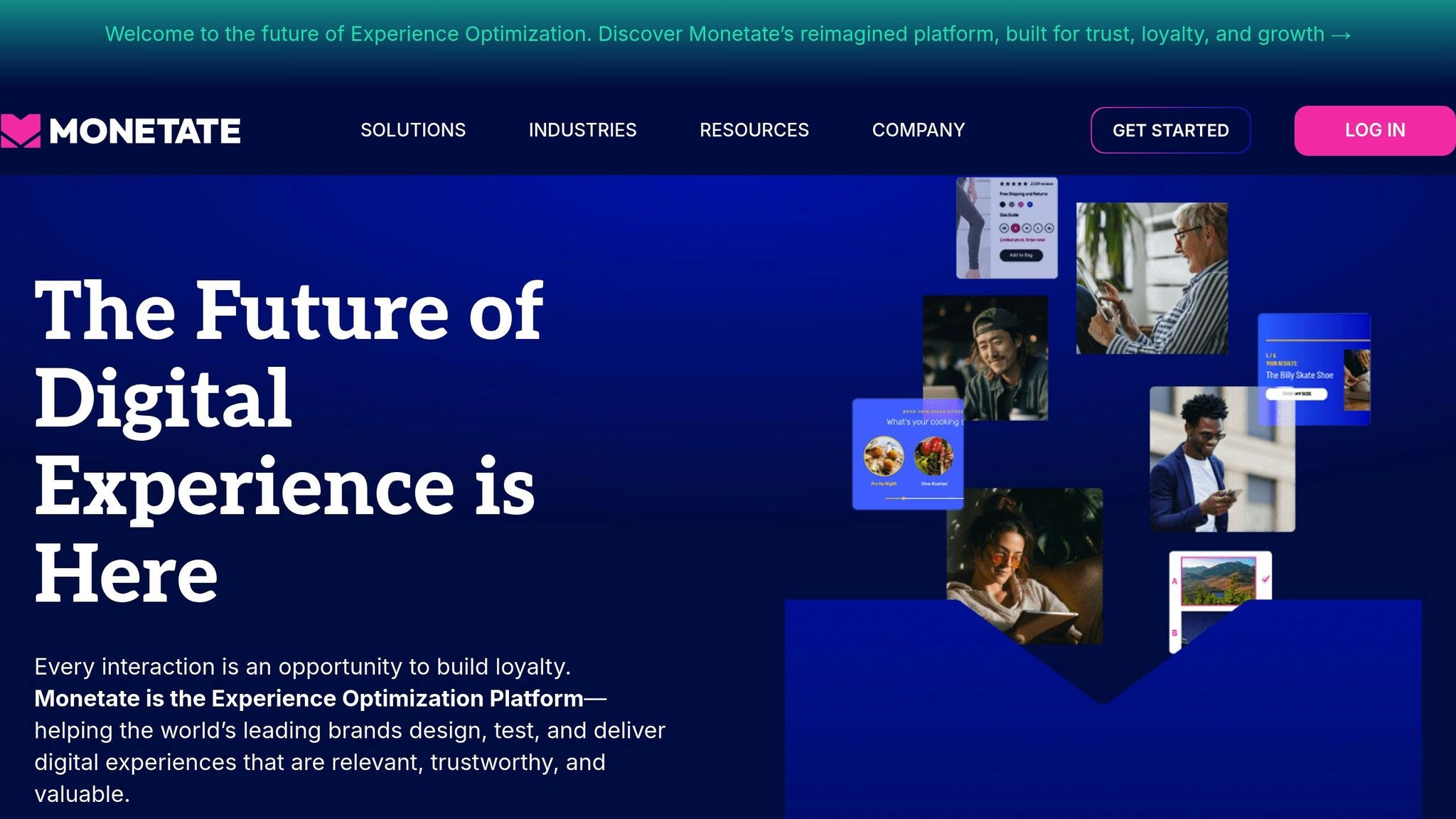
Monetate is a platform designed for eCommerce businesses seeking to create personalized, real-time customer experiences. As an enterprise-level AI personalization solution, it focuses on tailoring shopping journeys to individual customer behaviors.
Features
Monetate's AI-Powered Personalization Engine uses machine learning to analyze customer behavior, such as browsing habits, purchase history, and engagement patterns. This enables the platform to deliver customized product recommendations, dynamic content, and personalized shopping experiences.
The Visual Experience Editor makes it easy for marketers to adjust layouts, drag and drop elements, and tailor content without needing technical expertise.
With Advanced Segmentation, businesses can group customers based on behavioral data, demographics, and purchase history. For example, customers can be categorized as high-value shoppers, cart abandoners, or first-time visitors, allowing for highly targeted messaging.
A/B Testing and Multivariate Testing features enable businesses to experiment with different content, layouts, and recommendations. Monetate automatically directs traffic to the most effective variations, helping to improve conversion rates.
Integrations
Monetate integrates seamlessly with popular eCommerce platforms like Shopify, Magento, and WooCommerce. It also connects with analytics tools such as Google Analytics and Adobe Analytics, email marketing systems like Mailchimp and Klaviyo, and CRM platforms such as Salesforce and HubSpot.
Additionally, Monetate works with advertising tools like Google Ads and Facebook Ads Manager, allowing businesses to extend their personalization strategies to paid marketing campaigns.
Workflow Automation
The platform’s automation features streamline the delivery of personalized experiences. Behavioral Triggers activate specific actions based on customer behavior, such as showing targeted offers to users who repeatedly view a product without purchasing.
The Dynamic Content Delivery feature ensures that personalized recommendations, banners, and content blocks update in real time as users navigate the website, adapting to their individual profiles and browsing activity.
Campaign Automation allows marketers to set rules for delivering content based on factors like customer lifecycle stages, product trends, or inventory levels.
Pricing
Monetate uses a custom pricing model that depends on factors like monthly traffic, the number of personalization placements, and selected modules. Pricing details aren’t publicly available, requiring businesses to contact Monetate for a tailored quote. This approach reflects the platform’s focus on larger enterprises with bigger marketing budgets.
However, user feedback highlights some concerns about the pricing structure:
"Significantly overpriced compared to alternatives, little to no improvement in the already outdated product, combative customer support focused purely on extracting more money from clients."
– Kevin G., Sr. Product Manager, Design
"Ultimately we decided to go with a cheaper alternative due to budget cuts."
– Verified Reviewer, CEO, Research
Despite these criticisms, some users value its functionality:
"My favorite thing about Monetate is its ability to update my website without the need for IT support."
– Michelle K., Online Merchandising & Content Manager, Retail
Monetate’s pricing and feature set make it a better fit for large enterprises rather than small or medium-sized businesses looking for budget-friendly options.
7. Personyze
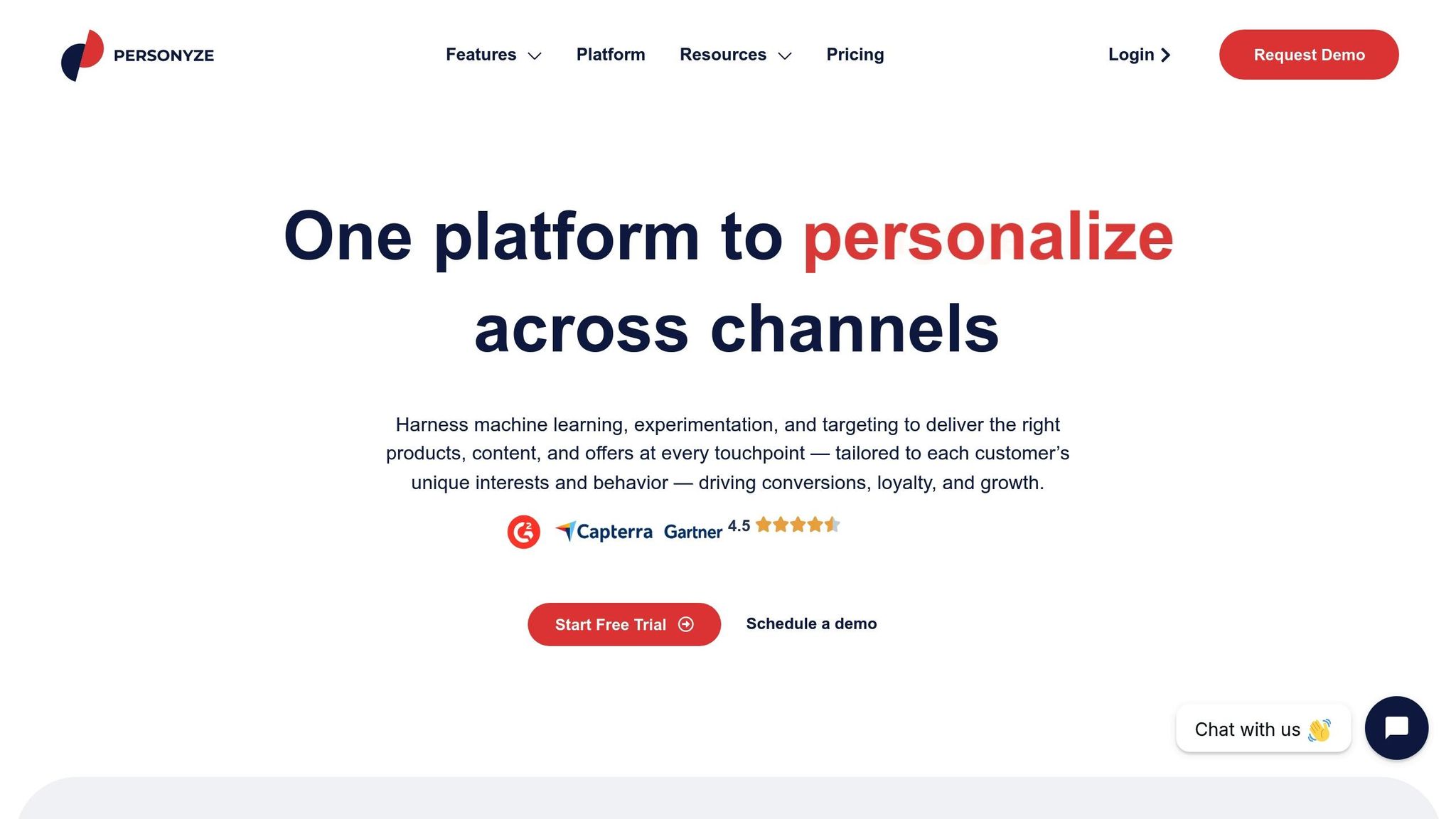
Personyze offers a platform designed to create real-time, personalized experiences across websites, mobile apps, and email campaigns. By combining behavioral tracking, machine learning, and dynamic content delivery, it helps businesses connect with their audience on a deeper level.
Features
Personyze stands out with its Real-Time Behavioral Tracking, which monitors visitor actions like page views, clicks, scroll depth, and time spent on-site. This data is continuously updated to refine customer profiles.
Its Smart Recommendations Engine uses advanced algorithms, including collaborative filtering and content-based techniques, to suggest products or content tailored to individual behaviors and patterns observed in similar users.
With Dynamic Content Personalization, businesses can adjust headlines, images, product descriptions, and even entire layouts based on visitor characteristics. Returning visitors benefit from tailored messaging, and the platform can automatically localize content to match their preferences.
The Cross-Channel Personalization feature ensures a consistent experience across websites, email campaigns, and mobile apps. This creates a seamless journey for users, no matter how they interact with the brand.
Personyze also offers Behavioral Triggers and Pop-ups that respond to user actions or inactivity. These include exit-intent pop-ups, time-sensitive offers, or content that appears as users scroll to specific points on a page.
To top it off, Personyze integrates effortlessly with popular platforms, enhancing its personalization capabilities.
Integrations
Personyze connects with leading eCommerce platforms like Shopify, WooCommerce, Magento, and BigCommerce, allowing businesses to set up integrations quickly. It also syncs with analytics tools such as Google Analytics and Adobe Analytics, combining personalization insights with broader performance metrics.
For email marketing, Personyze integrates with tools like Mailchimp, Constant Contact, and Campaign Monitor, enabling businesses to extend personalization into their email strategies. CRM integrations with platforms like Salesforce, HubSpot, and Pipedrive allow access to customer data and purchase histories for more precise personalization.
Additionally, Personyze supports advertising platforms like Google Ads and Facebook Ads Manager. These integrations enable businesses to create personalized retargeting campaigns based on user behavior and engagement.
Workflow Automation
Personyze uses automation to streamline engagement and personalization efforts.
Its Behavioral Workflow Triggers allow businesses to set specific rules that activate based on user actions. For instance, the platform can deliver targeted content when users visit certain pages, spend a set amount of time browsing, or display particular behaviors.
A/B Testing Automation ensures traffic is directed toward the best-performing content, refining personalization strategies without manual intervention.
Through Lead Scoring and Nurturing, Personyze evaluates visitor engagement and conversion potential. High-scoring leads are automatically prioritized for personalized tactics like special offers or enhanced customer service.
Pricing
Personyze offers tiered pricing based on website traffic and the number of personalization campaigns.
- The Starter Plan costs $300 per month and supports up to 100,000 monthly page views. It includes basic personalization features, behavioral tracking, and email integration.
- The Professional Plan is priced at $600 per month for up to 500,000 monthly page views. It adds advanced segmentation, A/B testing, and cross-channel personalization.
- The Enterprise Plan starts at $1,200 per month for higher traffic volumes. This plan includes custom integrations, dedicated account management, and advanced reporting.
All plans come with a 30-day free trial. Pricing scales with traffic volume beyond the base limits, and setup fees may apply for complex integrations or custom configurations, especially for enterprise clients with specialized needs.
8. Webflow Optimize
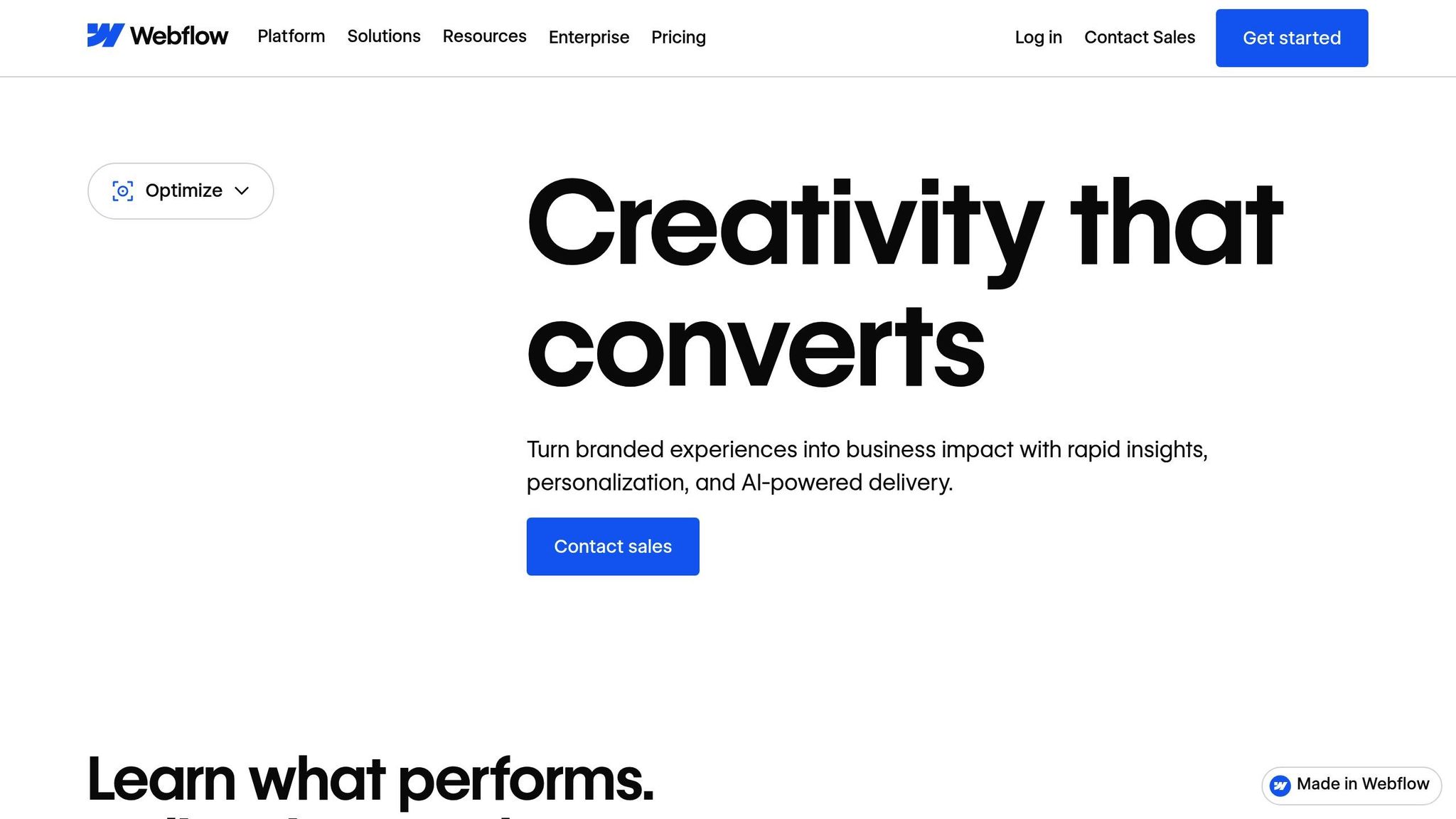
Webflow Optimize is a relatively new player in the AI personalization world, introduced in October 2024 during Webflow Conf 2024. This native add-on for Webflow sites brings together A/B testing, AI optimization, and personalization into a no-code solution.
"Webflow Optimize is an advanced, AI-powered A/B testing tool that allows you to create customized versions of your page to show to different visitors based on their characteristics and experiment with real-time content variations." - Mihajlo Ivanovic, SEO and Content Expert, Flow Ninja
The platform is built on the foundation of Intellimize, a testing solution acquired by Webflow and reimagined as its core optimization engine. This allows businesses to run data-driven experiments without needing developer input.
Here’s a closer look at what Webflow Optimize offers.
Features
- AI-Powered A/B Testing: Automatically generates and manages content variations tailored to visitor characteristics, aiming to boost engagement and conversions.
- Real-Time Content Personalization: Makes it easy to customize headlines, images, and call-to-action buttons dynamically - without writing any code - based on visitor data.
- Audience Insights and Targeting: Provides detailed analytics on how various visitor segments interact with different content, helping refine personalization strategies.
- AI Assistant: Offers guidance on setting up optimizations, suggesting elements to test and providing recommendations based on past data.
- Enhanced Match: Exclusive to the Enterprise plan, this feature uses advanced algorithms to fine-tune visitor identification and targeting.
Integrations
Webflow Optimize works seamlessly within the Webflow ecosystem while also offering integrations beyond it. It connects with Google Analytics 4, combining personalization insights with website performance data. For account-based marketing, it supports tools like Demandbase and 6Sense, helping create tailored experiences for specific accounts. Additionally, it integrates with CRM and marketing platforms such as Salesforce, Marketo, HubSpot, Mixpanel, and Segment, enabling businesses to use existing customer data for personalized campaigns. For non-Webflow sites, Webflow Optimize can still be implemented through a custom setup arranged with the Webflow sales team.
Pricing
Webflow Optimize offers tiered, usage-based pricing to fit businesses of different sizes:
- Standard Optimize Add-on: Priced at $299 per month (billed annually), this plan supports up to 500,000 monthly page views and includes up to 5 concurrent optimizations. Features include A/B testing, personalization, AI optimization, audience insights, targeting, and access to the AI Assistant.
- Optimize Enterprise Add-on: Designed for businesses with over 1 million annual page views, this plan offers custom pricing. It includes unlimited concurrent optimizations, Enhanced Match targeting, full integration with Webflow's Enterprise platform, and compatibility with account-based marketing tools and CRM systems.
- Non-Webflow Site Implementation: For businesses using non-Webflow sites, custom pricing is available through consultations with Webflow's sales team.
The pricing structure is based on monthly page views, ensuring flexibility as businesses grow. This aligns with the platform’s focus on scalability and real-time personalization, making it a valuable tool for dynamic optimization efforts.
Advantages and Disadvantages
Looking at the tools we've covered earlier, each one brings its own mix of strengths and challenges. These factors can guide US businesses in selecting the right solution based on their goals, resources, and budget.
Adobe Target is ideal for enterprises, thanks to its powerful testing capabilities and seamless integration within the Adobe Experience Cloud. However, it demands technical expertise and has a steep learning curve. Its pricing might also put it out of reach for smaller businesses.
Braze stands out with its mobile-first approach and ability to manage high-volume customer journeys, all while adhering to US data privacy standards. On the downside, costs grow as users increase, and advanced features may require technical know-how.
Dynamic Yield excels in personalization, blending machine learning with user-friendly visual editing tools. But its pricing structure can be complex, and there’s a risk of relying too much on automated decisions.
CleverTap offers strong analytics, effective mobile app personalization, and solid customer support - making it a great value. However, it lacks some advanced enterprise features and can face challenges integrating with legacy systems.
Insider combines personalization with predictive analytics, offering competitive pricing for mid-market companies and a fast implementation process. That said, it has fewer customization options and may encounter performance issues when handling large datasets.
Monetate caters specifically to e-commerce, providing robust A/B testing, platform integrations, and reliable ROI tracking. But its retail-centric focus might require additional tools for automation and broader use cases.
Personyze delivers flexibility with its widget-based approach, making it a good fit for small to medium businesses. It also offers effective behavioral targeting. However, it struggles with scalability for larger enterprises and provides fewer integration options.
Webflow Optimize brings AI-powered personalization to the Webflow platform, offering no-code implementation and simple pricing. While promising, it’s relatively new and primarily geared toward Webflow users, though custom implementations are possible.
| Tool | Scalability | Ease of Use | Support Quality | Compliance Features | Best For |
|---|---|---|---|---|---|
| Adobe Target | High | Complex | Enterprise-level | Strong | Large enterprises |
| Braze | High | Moderate | Good | Strong | Mobile-first businesses |
| Dynamic Yield | High | Good | Good | Moderate | E-commerce & retail |
| CleverTap | Good | Good | High | Moderate | Growing mobile apps |
| Insider | Good | Good | Good | Moderate | Mid-market businesses |
| Monetate | Moderate | Good | Good | Moderate | E-commerce focused |
| Personyze | Moderate | High | Good | Basic | Small to medium businesses |
| Webflow Optimize | Good | High | Good | Basic | Webflow users |
Ultimately, the right choice depends on your business's specific needs. Larger enterprises might lean toward Adobe Target or Dynamic Yield, while smaller businesses could benefit more from options like CleverTap, Personyze, or Webflow Optimize. For mobile-focused companies, Braze and CleverTap are solid picks, while e-commerce businesses might find Dynamic Yield or Monetate better suited for their specialized needs.
Conclusion
Choosing the right AI personalization tool comes down to your business size, goals, and available resources. Larger enterprises often benefit from robust platforms like Adobe Target and Dynamic Yield, which offer comprehensive features capable of managing complex personalization needs. However, these come with higher costs and require significant technical expertise to implement effectively.
For mid-sized businesses, finding a balance between functionality and affordability is key. Tools like Braze, with its focus on mobile strategies, or Insider, which supports broader digital personalization, strike that balance well. They deliver strong performance without the steep learning curve or investment of enterprise-level platforms.
Smaller businesses or those with limited resources may prefer simpler solutions like CleverTap, Personyze, or Webflow Optimize. These tools focus on the essentials of personalization while keeping costs and complexity manageable.
The type of business also plays a role. Mobile-first companies often lean toward Braze or CleverTap, while e-commerce brands gravitate toward platforms like Dynamic Yield and Monetate for optimizing retail performance.
Budget is another critical factor. Enterprise-level tools can cost tens of thousands of dollars annually, making them a serious investment. On the other hand, smaller-scale platforms range from a few hundred to a few thousand dollars per month, making personalization accessible for businesses of various sizes.
Implementation requirements also vary widely. For instance, Adobe Target often demands significant developer involvement, whereas tools like Personyze and Webflow Optimize offer user-friendly, no-code options that marketing teams can handle independently.
As AI personalization technology evolves, new features and capabilities continue to emerge. The key to success lies in aligning the tool’s features with your team’s expertise, budget, and long-term goals. By focusing on what matches your specific needs, you can achieve effective, real-time personalization without getting distracted by unnecessary features.
FAQs
How do AI personalization tools improve customer engagement and boost conversion rates?
AI-powered personalization tools take customer engagement to the next level by crafting experiences that feel uniquely tailored to each individual. These tools analyze massive amounts of customer data in real time, allowing businesses to offer spot-on recommendations, customized content, and dynamic interactions that resonate on a more personal level.
The impact is clear: personalization can boost conversion rates by up to 35%. Why? Because it creates stronger connections with customers and leaves them more satisfied. By using AI, businesses can fine-tune the customer journey, making every interaction count and delivering results that matter.
What should businesses look for when selecting an AI personalization tool?
When choosing an AI personalization tool, it's important to weigh a few key factors: scalability, integration capabilities, data security, and cost-efficiency. The tool should align with your business objectives and work smoothly with your current systems.
You’ll also want to look into the vendor’s track record, the quality of their customer support, and how well the tool can keep up with evolving industry trends. Reviewing case studies and examples of how the tool is used in real scenarios can give you a clearer picture of its performance. By focusing on these aspects, you can find a solution that fits your operational needs and long-term goals.
How do AI personalization tool pricing models differ for small businesses and large enterprises?
AI personalization tools come with pricing models designed to accommodate businesses of all sizes and requirements.
For small businesses, subscription-based or pay-as-you-go plans are popular choices. These models typically involve initial setup costs ranging from $10,000 to $50,000, making advanced AI solutions more attainable for companies operating within tighter budgets.
When it comes to larger enterprises, pricing often requires a more tailored approach. Options like tiered subscriptions, licensing fees, or usage-based pricing are common, reflecting the complexity and scale of their AI implementations. These flexible models allow companies to align their spending with specific operational needs and long-term strategic objectives.


